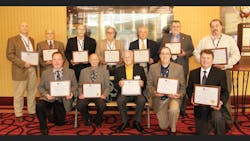Hawkins, Weller describe ATA Road Team membership as ultimate honor
LESS THAN a handful a tank truck drivers have been selected for the American Trucking Associations' America's Road Team. Two tank truck drivers selected most recently for the program described it as one of the greatest experiences they've had in their long driving careers.
Ron Hawkins, a driver with K-Limited Carrier, and Robert Weller, a driver for Hahn Transportation, discussed the benefits of the America's Road Team program during the National Tank Truck Carriers 63rd Annual Conference May 22-24 in Baltimore, Maryland. Hawkins is finishing his two-year Road Team stint that started in 2010. Weller was selected for the 2011-2012 Road Team at the end of last year.
Hawkins was the first tank truck driver in 19 years to be chosen for the Road Team. “It made me so proud to be able to represent this industry,” hesaid. “It is the icing on the cake for my career. I love what I do, and I'm proud to be here representing the Road Team.”
Promoting industry image
Weller said he just about fell over when his name was called out at the conclusion of the selection process. “This is an important program because it helps promote a positive image of this industry,” he said. “America's Road Team is important because it promotes highway safety.”
Community outreach is a big part of the program, and the drivers who make up America's Road Team make a multitude of public appearances to groups large and small. America's Road Team is a big advocate of the Department of Transportation's “Share the Road” program
“It is critical to raise awareness of the blind spots around trailer-trailer rigs,” Weller said. “If we can help one person, we've done our job.”
Hawkins added that Road Team members do a lot of outreach to the trucking industry itself. Road Team members attend safety banquets and meet with truck drivers across the United States.
“We get to do a lot of great things as Road Team drivers, but the best was participating in Wreaths Across America (a program that places Christmas wreaths on the graves of US servicemen),” he said. “As a veteran, I'd do that again in a heartbeat.”
Good job
Hawkins and Weller both agreed that driving a tank truck is a very good job. Hawkins said his father drove tanker rigs, and that influenced his decision. He stayed with tank truck operations because “you're always doing something different in this industry.”
For Weller, the tank truck industry has been a great place to work. “The tank truck drivers I work with are some of the safest drivers in the United States,” he said.
They were asked what the key to driver retention is in today's truck driving environment. “It starts with treating truck drivers with respect,” Hawkins said. “You have to get to know us and our families.”
What does it take to bring new people into this industry as drivers? “You have to recruit the right people,” Weller said. “You have to find people who really love this business.”
Hawkins added that not everyone is cut out to drive a tanker rig. “Some people never become comfortable with factors, such as (cargo) surge,” he said. “All of the drivers that you bring into the industry need proper training if you want them to stay in this business. They may need help in overcoming their initial fears of working with chemicals or other cargoes.”
Road Team support
Should a tank truck driver be part of every America's Road Team? The answer was a resounding yes. “There is no reason why we shouldn't have a tank truck driver on every Road Team, Hawkins said.
Weller added that the entire tank truck industry needs to support the Road Team and participate in the program.
Barbara Windsor, president and chief executive officer of Hahn Transportation and American Trucking Association chairman, pointed out that there is one big reason why tank truck drivers aren't on every Road Team. “Tank truck carriers don't nominate them,” she said.
Windsor went on to state that the tank truck industry is nothing without its drivers. “The trucking industry moves America, and we need to ensure that we are putting only the safest drivers in our trucks,” she said.
Windsor added that the regulatory fervor in Washington DC is making a tough job even more challenging for all truck drivers. Critical issues include possible changes in driver hours of service, CSA's pre-employment screening program (PSP), and highway funding.
“At ATA and its conferences, we are doing all we can to address hours of service and possible changes being considered by FMCSA (Federal Motor Carrier Safety Administration),” she said. “On another rulemaking issue, we have suggested that the federal government doesn't need to get involved in detention, because that has more to do with driver pay. Highway funding is a big concern for us because special interest groups are siphoning off money that is needed for highway maintenance and improvement.” ♦
About the Author
Charles Wilson
Charles E. Wilson spent 31 years covering the tank truck, tank container, and storage terminal industries throughout North, South, and Central America as the editor of Bulk Transporter. Prior to 1989, Wilson was managing editor of Bulk Transporter and Refrigerated Transporter and associate editor of Trailer/Body Builders. Before joining the three publications in Houston TX, he wrote for various food industry trade publications in other parts of the country. Wilson has a bachelor's degree in journalism from the University of Kansas and served three years in the U.S. Army.
